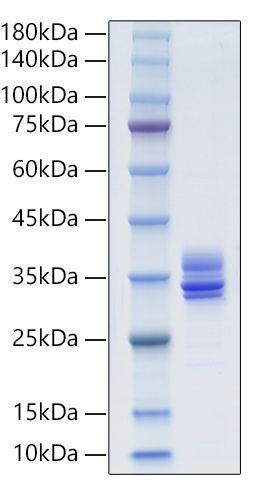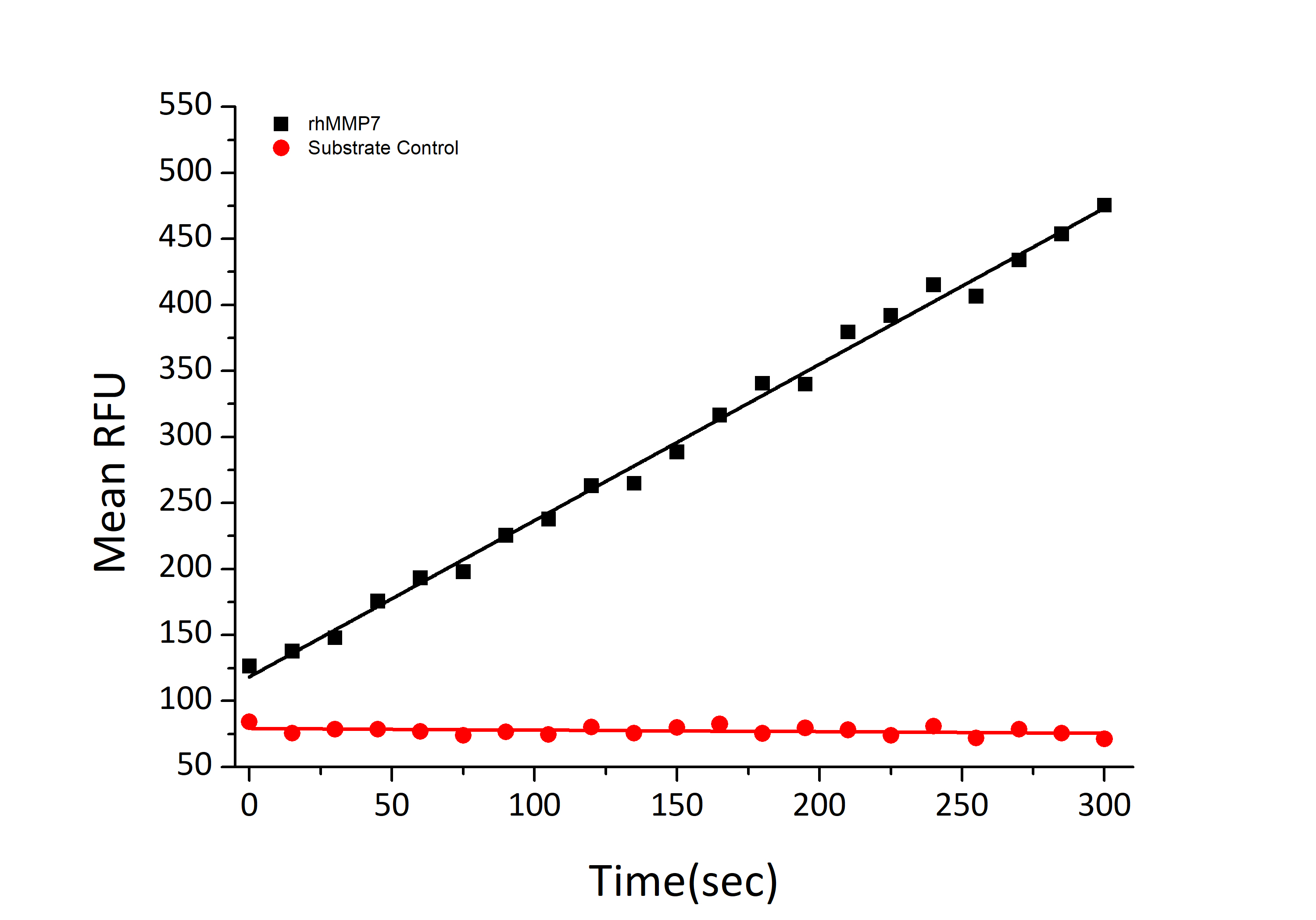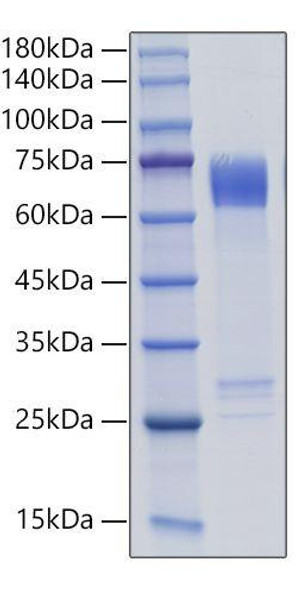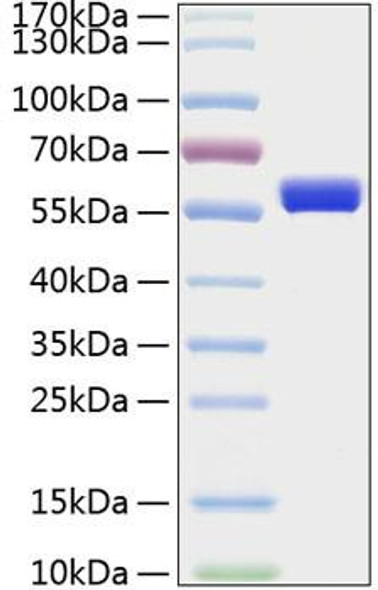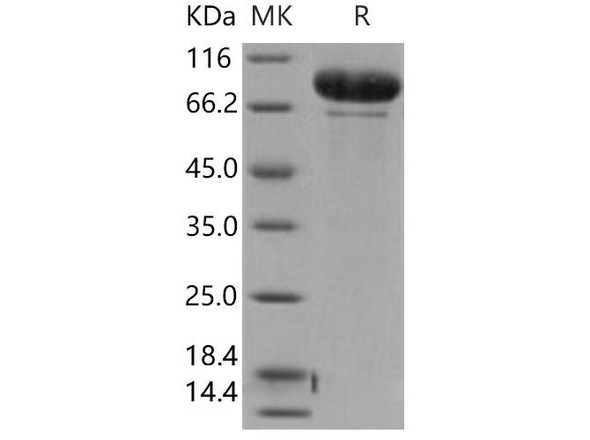Description
Recombinant Human MMP-7 Protein
The Recombinant Human MMP-7 Protein is a biologically active recombinant protein that plays a significant role in various cellular processes and signaling pathways in human biology. This protein is widely employed in immunological research, cell biology studies, protein-protein interaction analyses, and therapeutic development, providing researchers with a reliable tool for investigating MMP-7 function and its implications in health and disease.
This product (SKU: RPCB1918) is produced using advanced expression systems and features a C-His tag for convenient detection and purification. The protein exhibits a calculated molecular weight of 30.52 kDa with an observed molecular weight of 30-40 kDa under denaturing conditions, achieving ≥ 85 % as determined by SDS-PAGE.. Functional bioactivity has been validated through rigorous quality control assays, confirming its suitability for demanding research applications.
Key Features
| High Purity by Affinity Chromatography | |
| Mammalian & Bacterial Expression Systems | |
| High lot-to-lot consistency via strict QC |
| Product Name: | Recombinant Human MMP-7 Protein |
| SKU: | RPCB1918 |
| Size: | 10 μg , 20 μg , 50 μg , 100 μg |
| Reactivity: | Human |
| Synonyms: | MMP7, MPSL1, PUMP1, Matrilysin, 3.4.24.23, Matrin, Matrix metalloproteinase-7, MMP-7, Pump-1 protease, Uterine metalloproteinase |
| Tag: | C-His |
| Calculated MW: | 30.52 kDa |
| Observed MW: | 30-40 kDa |
| Gene ID: | 4316 |
| Protein Description: | High quality, high purity and low endotoxin recombinant Recombinant Human MMP-7 Protein (RPCB1918), tested reactivity in CHO Cells and has been validated in SDS-PAGE.100% guaranteed. |
| Endotoxin: | < 0.01 EU/μg of the protein by LAL method |
| Purity: | ≥ 85 % as determined by SDS-PAGE. |
| Formulation: | Lyophilized from 0.22 μm filtered solution in 10mM HEPES,5mM CaCl2,150mM NaCl (pH 7.5). Normally 8% trehalose is added as protectant before lyophilization. |
| Bio-Activity: | Measured by its ability to cleave the fluorogenic peptide substrate, Mca-PLGL-Dpa-AR-NH2 (RD,Catalog # ES001). The specific activity is >812 pmol/min/µg, as measured under the described conditions. |
| Reconstitution: | Centrifuge the vial before opening. Reconstitute to a concentration of 0.1-0.5 mg/mL in sterile distilled water. Avoid vortex or vigorously pipetting the protein. For long term storage, it is recommended to add a carrier protein or stablizer (e.g. 0.1% BSA, 5% HSA, 10% FBS or 5% Trehalose), and aliquot the reconstituted protein solution to minimize free-thaw cycles. |
| Storage: | Store at -20℃.Store the lyophilized protein at -20℃ to -80 ℃ up to 1 year from the date of receipt. After reconstitution, the protein solution is stable at -20℃ for 3 months, at 2-8℃ for up to 1 week. |
MMP-7,Degrades casein, gelatins of types I, III, IV, and V, and fibronectin. Activates procollagenase.Matrix metalloproteinases (MMPs) are a family of zinc and calcium dependent endopeptidases with the combined ability to degrade all the components of the extracellular matrix. MMP-7 (matrilysin) is expressed in epithelial cells of normal and diseased tissues, and is capable of digesting a large series of proteins of the extracellular matrix including collagen IV and X, gelatin, casein, laminin, aggrecan, entactin, elastin and versican. MMP-7 is implicated in the activation of other proteinases such as plasminogen, MMP-1, MMP-2, and MMP-9. In addition to its roles in connective tissue remodeling and cancer, MMP-7 also regulates intestinal alpha ‑defensin activation in innate host defense, releases tumor necrosis factor-alpha in a model of herniated disc resorption, and cleaves FasL to generate a soluble form in a model of prostate involution. Structurally, MMP-7 is the smallest of the MMPs and consists of two domains: a pro-domain that is cleaved upon activation and a catalytic domain containing the zinc-binding site.


